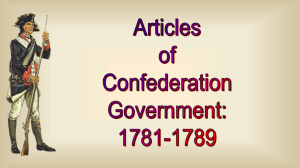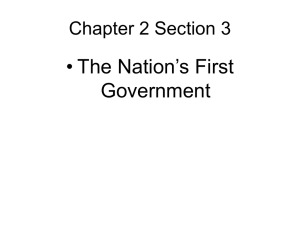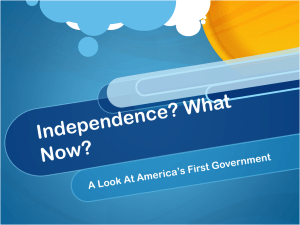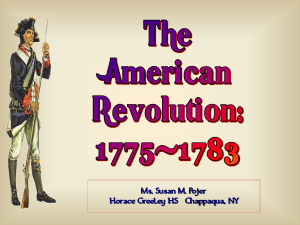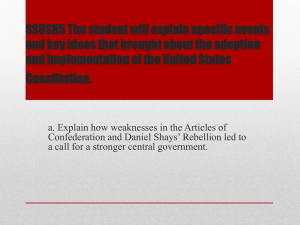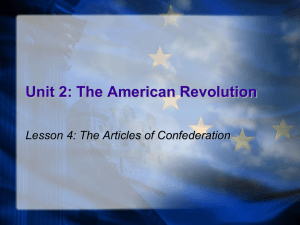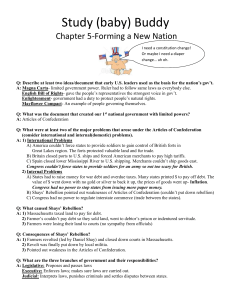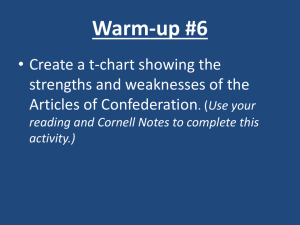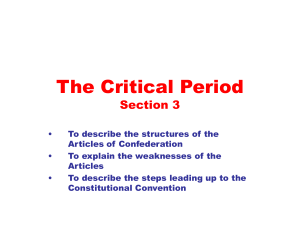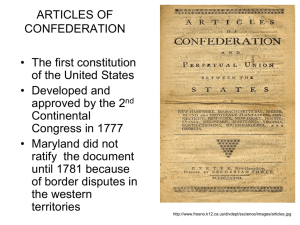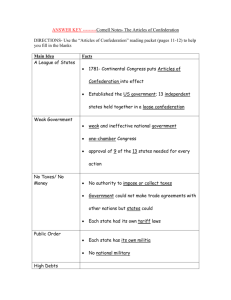We the People Lesson 112
advertisement
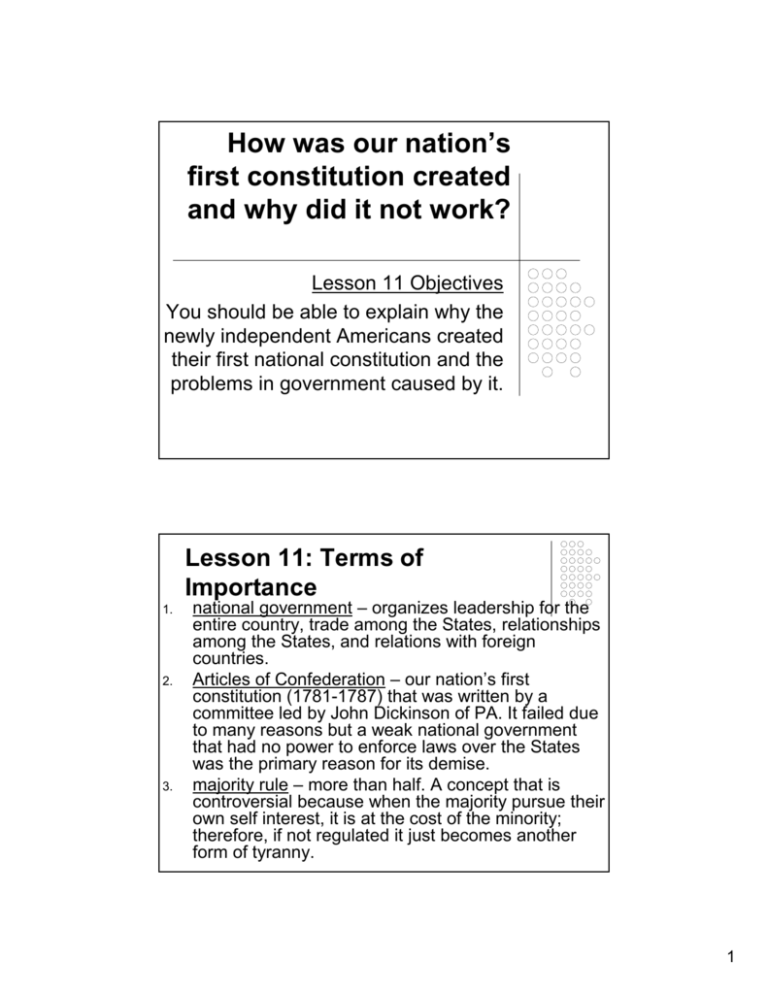
How was our nation’s first constitution created and why did it not work? Lesson 11 Objectives You should be able to explain why the newly independent Americans created their first national constitution and the problems in government caused by it. Lesson 11: Terms of Importance 1. 2. 3. national government – organizes leadership for the entire country, trade among the States, relationships among the States, and relations with foreign countries. Articles of Confederation – our nation’s first constitution (1781-1787) that was written by a committee led by John Dickinson of PA. It failed due to many reasons but a weak national government that had no power to enforce laws over the States was the primary reason for its demise. majority rule – more than half. A concept that is controversial because when the majority pursue their own self interest, it is at the cost of the minority; therefore, if not regulated it just becomes another form of tyranny. 1 4. loyalists – people who were still loyal to the king and England after the Revolutionary War. 5. factions – a group of people who seek to promote its own interest 6. Shays’ Rebellion – a dramatic rebellion in MA, led by farmer and revolutionary veteran Daniel Shays, that finally convinced many people of the need for a stronger national government. It convinced the leaders of the States to call a meeting in Philadelphia called the Constitutional Convention (1787). The Creation of The Articles of Confederation 1776 – 2nd Continental Congress appoints a committee to be led by John Dickinson of PA States argued for more than a year about what type of central government would be created. 2 Major Fears Shaped the Articles Fear of a national government that was too strong Fear that some states would have more power than others in the national government 2 Fear 1: Overpowering National Government Once the war started versus Britain, it was like each state was a separate nation with its own constitution and government. To the people at the time, their state was their country. The Founders agreed that the nation needed a national government. They believed that most of the power should stay close to home with the states because citizens could control it better. Many also feared a strong national government would eventually lead to it taking rights from citizens. The solution? Create a weak national government Fear 1: Overpowering National Government Weak National Government The government created was unicameral. No executive or judicial branch was created. The Continental Congress had little power. No power over any citizens No power to collect taxes – it could only request money from the states Took at least 9 of 13 states to agree on a national law for it to be approved (ex. war, money, etc…) 3 Fear 2: Some state would dominate others The Founders wanted to make sure the new government could not threaten their state’s interest. They feared that more wealthy and populated states would dominate the other states. Solution? All states would receive 1 vote in Congress regardless of population or wealth. Articles of Confederation Approved in 1781 and served as our nation’s first constitution until 1788. 4 Problems caused by the weaknesses No money or power to get it 1. • • • • Congress had to rely on contributions from states to operate. No power to force states to live up to their promises. States promised to give $10 million but only gave $1.5 million Congress was forced to borrow money to pay for the war. Problem #2 2. No power of the state governments and their citizens No power to regulate the people’s behavior Loyalists remained in the U.S. but Congress could not protect their rights 5 Problem #3 3. Unenforceable trade agreements Congress had the power to make treaties and trade agreements with other countries but no power to force states to honor them. Some Americans imported from other nations and then refused to pay. U.S. gets a bad name. Problem #4 4. Unfair competition among the states Some states forbid their citizens to sell or buy from neighboring states. State printed their own money and refused to accept some of their neighbors currency. Caused people to lose jobs and live in poverty 6 Problem #5 5. Threats to citizens’ right to property Factions formed in state legislatures They passed laws that cancelled debts, took land from loyalists and others. Many began to argue that majority rule was being used to benefit one class of people at the expense of common welfare. Shays’ Rebellion and seeds of change Nov. 1786 – farmers led by Daniel Shays lead a rebellion against banks and the MA government. Why? Factions were taking people’s property unfairly and jailing them. MA asked Congress for troops and help. Congress was unable to help. The rebellion was eventually put down after several weeks. 7 Seed of Change Shays Rebellion caused state leaders to recognize the weaknesses and the dangerous situation the Articles caused. It led them to call for a Constitutional Convention to be held in Philadelphia, PA in the summer of 1787 to fix the problems caused by the Articles. George Washington wrote to James Madison concerning the rebellion, “ We are either a united people or we are not. If the former, let us act as a nation. If we are not, let us no longer act a farce by pretending to it.” Lesson 11 Review 1. 2. The Articles of Confederation showed its writers’ fears of a strong national government and left most important powers to the states. What important powers were denied the national government by the Articles? Why do you suppose the smaller states were satisfied with the government set up by the Articles? 8 Lesson 11 Review 3. The Articles of Confederation demonstrated a distrust of a strong national government. Many people today share this attitude toward national power. Do you believe it’s justified? Why? 4. What are “factions”? Explain why they were considered a problem for the American government in the 1780s. What organized groups exist today that the Founders would call factions? 9
